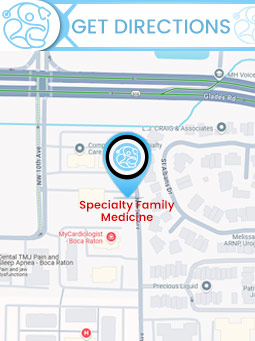Herniated Disc Treatment in Boca Raton, FL
A herniated disc occurs when the soft, inner part of a spinal disc pushes through a tear in the outer layer, putting pressure on nearby nerves. Symptoms include localized back or neck pain, radiating pain to the arms or legs, and numbness or tingling in the affected area. In severe cases, it may also cause weakness and difficulty with movement. At Specialty Family Medicine, Board-Certified Dr. Ayokunle Fatade offers personalized care to manage symptoms and help improve your mobility. For more information, contact us today or schedule an appointment online. We are conveniently located at 1599 NW 9th Ave, Suite 4, Boca Raton, FL 33486.


Table of Contents:
What is a herniated disc?
What causes a herniated disc?
What symptoms develop due to a herniated disc?
How long does it take to recover from a herniated disc?
Can a herniated disc cause chronic pain?
How Does Dr. Ayokunle Fatade Tailor Herniated Disc Treatment Plans at Specialty Family Medicine in Boca Raton, FL?
A herniated disc, also known as a slipped or ruptured disc, occurs when the soft inner gel-like core of a spinal disc pushes through a tear or weakness in the outer layer of the disc. The spine is made up of a series of vertebrae separated by intervertebral discs that act as shock absorbers. When one of these discs is damaged, it can cause the inner material to protrude, potentially pressing on nearby nerves. This can result in pain, numbness, or weakness in the affected area. Herniated discs are most common in the lower back (lumbar spine) but can occur in the neck (cervical spine) as well. While some people with herniated discs experience no symptoms at all, others may suffer from significant discomfort. Treatment for a herniated disc varies depending on the severity and location but often includes rest, physical therapy, and in some cases, surgery.
A herniated disc is typically caused by a combination of age-related wear and tear and injury. Over time, spinal discs lose their flexibility and become more prone to damage. This condition is known as degenerative disc disease, which naturally occurs with aging. However, other factors can contribute to a herniated disc, including:
• Injury or Trauma: Lifting heavy objects incorrectly, a fall, or sudden twisting movements can cause a disc to rupture or slip.
• Repetitive Stress: Repeated strain on the spine from activities like heavy lifting, bending, or twisting may gradually weaken the disc’s outer layer, leading to a herniation.
• Poor Posture: Sitting or standing in poor posture for extended periods can contribute to abnormal pressure on the spine, increasing the risk of disc herniation.
• Obesity: Excess weight puts added stress on the spine, increasing the risk of a herniated disc.
• Genetics: Some individuals may be more predisposed to herniated discs due to genetic factors that affect spinal structure and health.
The symptoms of a herniated disc can vary depending on the location of the herniation and whether it presses on nearby nerves. Common symptoms include:
• Pain: Pain is the most common symptom and may be localized in the back or neck or radiate to other areas like the legs (sciatica) or arms.
• Numbness or Tingling: You may experience sensations of numbness, tingling, or a “pins and needles” feeling, especially in the limbs.
• Weakness: Muscle weakness in the legs or arms may occur if the herniated disc compresses a nerve that controls the affected muscles.
• Radiating Pain: If the disc presses on a nerve, pain may travel down the limbs. For example, if the herniation occurs in the lower back, pain can radiate down the leg (sciatica).
• Decreased Range of Motion: Stiffness or a limited range of motion may result from muscle spasms or pain.
• Loss of Bladder or Bowel Control: In rare cases, if the herniated disc puts pressure on specific nerves, it can cause loss of bladder or bowel control, a serious medical condition that requires immediate attention.
The recovery time from a herniated disc varies depending on the severity of the herniation, the effectiveness of treatment, and the individual’s health. For many individuals, mild herniations can improve within a few weeks to a few months with conservative treatment, which typically includes:
• Rest: Short periods of rest help alleviate pressure on the disc.
• Physical Therapy: Strengthening exercises, stretching, and postural corrections can help relieve pressure on the affected nerve.
• Medications: Over-the-counter pain relievers, such as NSAIDs, or stronger prescription medications can help manage pain and inflammation.
• Heat or Ice Therapy: Applying heat or ice to the affected area can help relieve pain and reduce swelling.
In more severe cases, or if conservative treatments don’t relieve symptoms, recovery may take longer, and medical interventions such as injections or surgery may be needed.
A herniated disc can lead to chronic pain if left untreated or if the damage is severe. While many people experience relief with conservative treatments, others may have persistent pain due to ongoing pressure on the nerves, structural changes in the spine, or the development of complications such as spinal stenosis or degenerative disc disease. Chronic pain can also develop if the herniation is not properly managed, leading to recurring flare-ups over time.
In some cases, nerve damage caused by a herniated disc can result in lasting numbness, weakness, or tingling, contributing to long-term discomfort. People with chronic pain may experience reduced mobility, muscle weakness, and limitations in daily activities. However, with appropriate treatment, such as physical therapy, medications, it is possible to manage and reduce chronic pain, allowing individuals to regain function and improve quality of life.
Dr. Ayokunle Fatade, board-certified at Specialty Family Medicine in Boca Raton, FL, provides personalized treatment plans for herniated disc management with a focus on non-surgical, holistic approaches. He begins by thoroughly evaluating each patient’s medical history, symptoms, and lifestyle factors. Based on this assessment, Dr. Fatade creates a tailored treatment plan that aims to address pain, improve spinal health, and enhance overall quality of life. His approach includes lifestyle modifications such as posture correction, ergonomic adjustments, and weight management to reduce spinal strain and improve function.
With over 20 years of experience, Dr. Fatade’s goal is to treat the root causes of pain rather than just masking the symptoms. As a board-certified physician, he emphasizes long-term wellness and sustainable relief, helping patients regain mobility and function while minimizing the need for medications. For more information, contact us today or schedule an appointment online. We are conveniently located at 1599 NW 9th Ave, Suite 4, Boca Raton, FL 33486. We serve patients from Boca Raton FL, Highland Beach FL, Lighthouse Point FL, Kings Point FL, Delray Beach FL, Deerfield Beach FL, Boynton Beach FL, and surrounding areas.

Additional Services You May Need

Additional Services You May Need
▸ Back Pain
▸ Neck Pain
▸ Neuropathy
▸ Arthritis
▸ Sciatica
▸ Chronic Pain
▸ Motor vehicle accident
▸ Crohn’s Disease
▸ Parkinsons
▸ Post Surgical Pain
▸ Headaches
▸ Migraines
▸ Achilles Pain
▸ Foot Pain
▸ Plantar Fasciitis
▸ Elbow Pain
▸ Tennis Elbow
▸ Joint Pain
▸ Shoulder Pain
▸ Irritable Bowel Syndrome
▸ Overweight/Obesity
▸ Chest Pain Syndrome
▸ Osteoporosis
▸ Endometriosis
▸ Menstrual Pain
▸ Rheumatoid Arthritis






